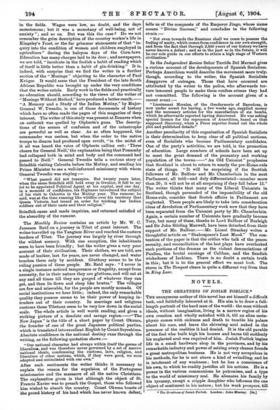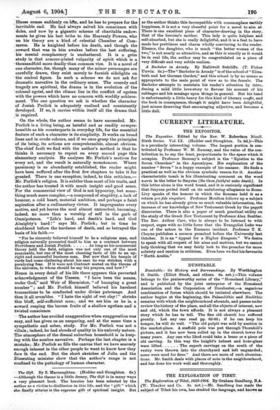THE anonymous author of this novel has set himself a
difficult task, and faithfully laboured at it. His aim is to draw a full- length portrait of the hard man of the world : the man without ideals, without imagination, living in a narrow region of his own creation and wholly satisfied with it, till an alien meta- physic comes with sickness and death to tumble his palace about his ears, and leave the shivering soul naked in the presence of the realities it had denied. It is the old parable of the fool who built high his houses and barns till suddenly his neglected soul was required of him. Josiah Porlick begins life in a small hardware shop in the provinces, and by his remarkable industry and power of seizing every chance founds a great metropolitan business. He is not very scrupulous in his methods, for he is not above a kind of swindling, and he is intolerant of any weakness ; but he has a conscience of his own, to which he readily justifies all his actions. He is a power in the various communions he patronises, and a type to the world of missionary zeal. He alienates his family by his tyranny, except a cripple daughter who be'comes the one object of sentiment in his nature ; but his work prospers, till • The Greatness of Josiah Porlick. London : John Murray. [Oa.]
illness comes suddenly on bib, and he has to prepare for the inevitable end. He had always salved his conscience with
doles, and now by a gigantic scheme of charitable endow- ments he gives his last bribe to the Heavenly Powers, who on his theory are a kind of celestial Chamber of Com-
merce. He is knighted before his death, and though the . coward that was in him awakes before the last suffering, his mental complacency is unshattered. It is a grim study in that armour-plated vulgarity of spirit which is a thousandfold more deadly than common vice. It is a novel of one character, for, though many of the minor personages are carefully drawn, they exist merely to furnish sidelights on the central figure. In such a scheme we do not ask for dramatic narrative in the ordinary sense. The comedy and tragedy are spiritual, the drama is in the evolution of the colossal egoist, and the climax lies in the conflict of egoism with the powers which have no concern with worldly achieve- ment. The one question we ask is whether the character of Josiah Porlick is adequately realised and consistently developed. If so, it carries within itself all the drama that is required.
On the whole, the author seems to have succeeded. Mr. Porlick is a living being, as hateful and as readily compre-
hensible as his counterparts in everyday life, for the essential feature of such a character is its simplicity. It works on broad lines and in crude colours, and if we once grasp the principles of its being, its actions are comprehensible, almost obvious. The chief fault we find with the author's method is that he thinks it necessary to repeat on every second page this elementary analysis. He analyses Mr. Porlick's motives for
every act, and the result is naturally monotonous. Where -parsimony is so abundantly established, the reader might have been suffered after the first few chapters to take it for granted. There is one exception, indeed, to this criticism,—
Mr. Porlick's religion. It is subtler than most of his traits, and the author'has treated it with much insight and good sense.
For the commercial view of God is not hypocrisy, but some- thing much more complex,—a compound of stupidity, a lack of humour, a cold heart, material ambition, and perhaps a faint
aspiration after a rudimentary virtue. It impregnates every motive, and yet leaves the soul almost untouched, becoming, indeed, no more than a worship of self in the garb of Omnipotence. " Life's hard, and death's hard, and God Almighty's hard !" says Mr. Porlick ; but in time he shuddered before the hardness of death, and so betrayed the basis of his faith "For he sincerely believed himself to be a religious man, and religion naturally presented itself to him as a contract between
Providence and Josiah Porlick As long as his commercial theory held the field, religion was not only one of the most reasonable, but one of the most cheering facts of life to an up- right and successful business man. But now that his temple of cards had come clattering about his ears he was stricken with a paralysing fear. If it were not Contract seated on the throne of the universe, to whom should he say his prayers, and how P " Hence in every detail of his life there appears this perverted acknowledgment of the Unseen. " I have been the means, under God," said Weir of Hermiston, " of haanging a great number " ; and Mr. Porlick himself believed his harshest transactions to be conducted under divine patronage. And then it all crumbles. "I hate the sight of wet clay !" shrieks this bluff, self-sufficient man ; and we see him as he is, a -coward reaping the barren fruits of a shallow egotism and a twisted conscience.
The author has avoided exaggerationwhen exaggeration was easy, and has given us an unsparing, and at the same time a sympathetic and sober, study. For Mr. Porlick was not a villain ; indeed, he had shreds of quality in his unlovely nature. The atmosphere of the dismal suburban household is in keep- ing with the sombre narrative. Perhaps the last chapter is a mistake; ,Mr. Porlick so fills the canvas that we have scarcely enough interest in the other people to want to know how they fare it the end. But the short sketches of Julia and the 'Dissenting minister show that the author's range is not confined to the pathology of human character.







































 Previous page
Previous page